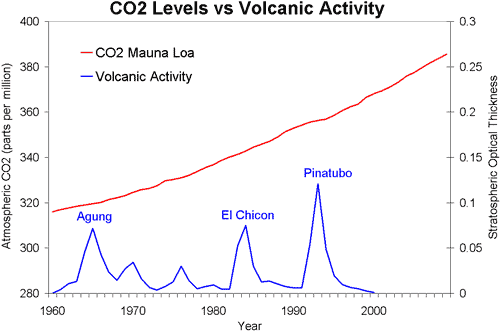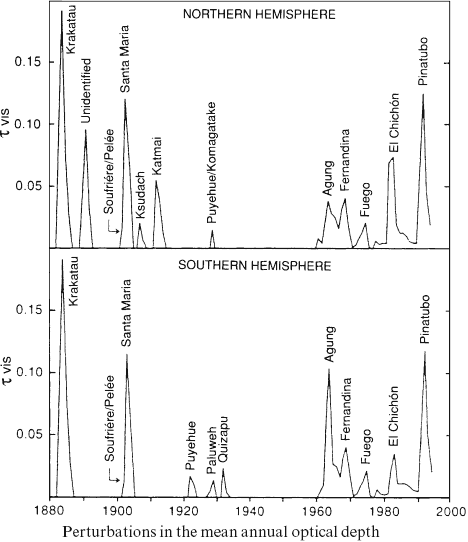Two attempts to blame global warming on volcanoes
Posted on 18 January 2010 by John Cook
There are a number of skeptic arguments against man-made global warming, many of which are mutually exclusive. You can't blame global warming on the sun one day, El Nino the next day and CFCs the day after, all the while claiming global cooling is occuring although this is in doubt because of suspect surface measurements. One hat thrown into the ring of global warming culprits is volcanoes. In fact, there are two volcano arguments, each mutually exclusive. One alternative is that volcanoes emit more CO2 than humans. The other is that a drop in volcanic activity caused global warming. So both volcanic activity and a lack of volcanic activity causes global warming. Way to cover your bases!
First, let's look at the argument that volcanoes emit more CO2 than humans. Volcanoes emit CO2 both on land and underwater. Underwater volcanoes emit between 66 to 97 million tonnes of CO2 per year (Morner 2002). However, this is balanced by the carbon sink provided by newly formed ocean floor lava. Consequently, underwater volcanoes have little effect on atmospheric CO2 levels. The greater contribution comes from subaerial volcanoes (subaerial meaning "under the air", refering to land volcanoes). Subaerial volcanoes are estimated to emit 242 million tonnes of CO2 per year (Morner 2002).
In contrast, humans are currently emiting around 29 billion tonnes of CO2 per year (EIA). In other words, human CO2 emissions are over 100 times greater than volcanic emissions. This is apparent when comparing atmospheric CO2 levels to volcanic activity since 1960. Even strong volcanic eruptions such as Pinatubo (which emitted around 42 million tonnes of CO2) had little discernable impact on CO2 levels. In fact, the rate of change of CO2 levels actually drops slightly after a large volcanic eruption, possibly due to the cooling effect of aerosols.

Figure 1: Atmospheric CO2 levels measured at Mauna Loa, Hawaii (NOAA) and Stratospheric Aerosol Optical Thickness, a measure of volcanic activity (NASA GISS).
In fact, the cooling effect of a volcanic eruption leads to the second argument of how a drop in volcano caused global warming. Volcanoes emit sulfate aerosols which reflect incoming sunlight, cooling the planet. A large volcanic eruption such as the Pinatubo eruption in 1991 can have a global cooling effect of 0.1°–0.3°C for several years (Robock 1994, Zielinski 2000). However, mega-eruptions or a series of large eruptions can have a cooling effect that take decades to wear off, giving a perceived warming effect. Zielinski 2000 studies past volcanoes, particularly over the past few centuries:

Figure 2: Changes in optical depth from 1880 to 2000.
Zielinksi concluded "the lack of any climatically effective volcanism in the period 1920s to early 1950s undoubtedly contributed to the overall warm conditions during those decades." (Zielinski 2000). This is confirmed by Hegerl 2003 who found that "early 20th century warming is attributed to a composite of greenhouse warming, an uncertain contribution from solar forcing, and a recovery from a previous period of heavy volcanism".
Similarly, Bertrand 1999 found that "the lack of volcanism during the period 1925-1960 could account, at least partly, for the observed warming trend in this period". Bertrand was investigating the effect of solar and volcanic influence on climate and concluded "these are clearly not sufficient to explain the observed 20th century warming and more specifically the warming trend which started at the beginning of the 1970s".
In short, a lack of volcanic activity had some part in temperature rise over the first half of the 20th century. However, it has had little to no part in the modern global warming trend that began in the 1970's. On the contrary, relatively frequent volcanic activity in the late 20th century may have masked some of the warming caused by CO2.
So we have two skeptic arguments seeking to blame global warming on volcanoes. One says volcanic activity caused global warming. The other says a lack of volcanic activity caused global warming. The two arguments have one thing in common - they're both woefully inadequate in establishing a link between volcanoes and the last few decades of global warming.































 Arguments
Arguments






























BTW, thanks for posting that paper. When I get around to the "heat from underwater volcanoes are causing global warming" argument, Barnett et al is a key part of the answer.
We do have a fairly high degree of understanding of how volcanoes affect climate. This was demonstrated when Mount Pinutabo erupted. It gave climate scientists the opportunity to predict how global temperatures would respond to the injection of sulfate aerosols in the atmosphere. Hansen 2007 compares the model predictions to actual observations, shown below. The model results also confirmed the climate's net positive feedback - as temperatures cooled, water vapour in the atmosphere lessened which amplified cooling.
There is a third argument made that volcanoes cause global warming. Many underwater volcanoes heat the ocean and transfer heat via the PDO, AMO, ENSO etc.
Is there any debunking of that anywhere?
JohnSeers @49:
Without seeing details of the claim you are mentioning, it sounds like that would be a variation on the geothermal heat myth. You can read more about that here:
https://skepticalscience.com/underground-temperatures-control-climate.htm